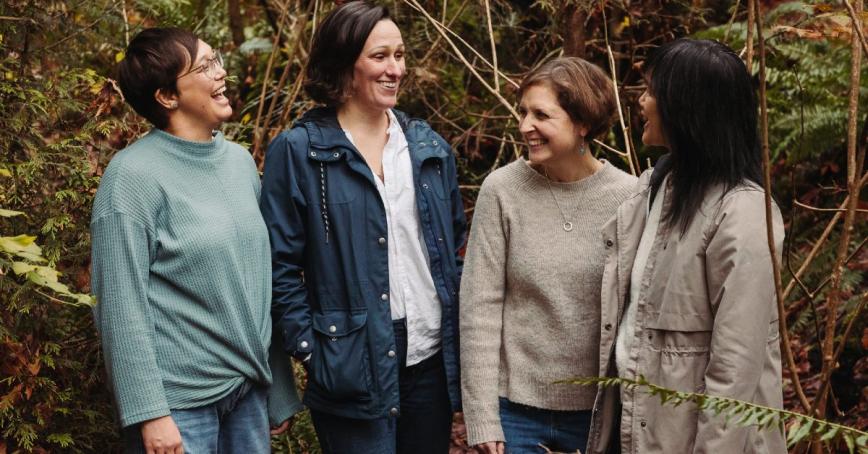Reshaping Young Adult Cancer Care: A Partnered, Participatory Approach
Topics
Featured
Share online

Learn more about the Master of Arts in Leadership Health Specialization.
Cheryl Heykoop is an associate professor in Royal Roads University’s Master of Arts in Leadership Health Specialization program and a Michael Smith Health Research BC Scholar. She also leads Anew, a research collaborative working to improve cancer care and support for young adults in British Columbia. For Heykoop, this work is deeply personal.
When she was 34 years old, Heykoop was diagnosed with cancer and the experience taught her that cancer is different for young adults than it is for older adults or children. There are often many additional complex medical and life needs to be addressed. Knowing what that’s like — but also how to conduct participatory research —fueled Heykoop’s efforts.
“As I navigated the cancer care system, it became very clear that it's not designed for young adults. I realized that I had this lived experience and this background in participatory research so how could I not try to make the system better? I recognized an opportunity to facilitate change that I had to pursue.
“In Canada, nearly 9,200 young adults are diagnosed with cancer each year [but] there are limited cancer care and support programs specific to this age group,” notes Heykoop.
Young adults include anyone diagnosed with cancer between the ages of 15 to 39, an age group busy navigating key life transitions: many are becoming independent, completing education, building careers, beginning families, and caring for elders.
Over the last three years, Anew has worked in partnership with young adults, BC Cancer, and BC Children’s Hospital to learn more about the unique care and support needs of this patient group and create changes for young adults navigating cancer.
Now, thanks to $50,000 of new funding from the Rix Family Foundation, the team is continuing this work including designing a provincial young adult cancer care and support program to help young adults navigate the cancer system; decide whether - and how - to preserve fertility; access counselling support to handle changed relationships with friends and family and the uncertainty of living with cancer; deal with back-to-work following treatment; learn how best to connect with teachers or professors about medical issues; and access peer support about dating and sexual health.
Equally important is recognizing that certain communities of young adults have additional challenges that health care systems have historically underserved. Members of racialized groups, for example, have distinct cultural needs while 2SLGBTQIA+ individuals face their own unique challenges. Young people who live outside of major centres also have greater difficulty accessing services.
The Rix Family Foundation support will enable the team to understand and identify the distinct needs and priorities of young adults from these underserved groups and ensure they are addressed in efforts to improve young adult cancer in BC.
“What's most important for Anew is ensuring that the voices and perspectives of young adults are at the centre of every initiative to improve their care," says Heykoop. "That's really the crux of our research at Anew: what do young adults need to feel better supported and cared for by the cancer care system, and how do we create programs to support that outcome?”
A recent example is a pilot project Anew developed in collaboration with BC Cancer where young adults newly diagnosed with breast cancer were offered counselling within 48 hours of diagnosis (counselling typically happens during treatment). Another project, with BC Cancer and BC Children’s Hospital, supports young adults and their care providers to navigate conversations about fertility preservation – a critical conversation for many.
Programs also need to extend beyond diagnosis and treatment into survivorship and ongoing support. “If we look at survivorship of young adults many are living 50- or 60-years post-diagnosis,” says Heykoop. “So, both up-front and ongoing support is fundamental to the health and well-being of young adults in the long term.”
To achieve those goals, the Anew team continues to work in close partnership with young adults, BC Cancer, BC Children’s Hospital, clinicians and funders to raise awareness of the unique realities of young adults and advocate for change.
“We have a collective responsibility to improve the system for young adults and we are all committed to making it happen,” notes Heykoop.
Learn more about the Master of Arts in Leadership Health Specialization.